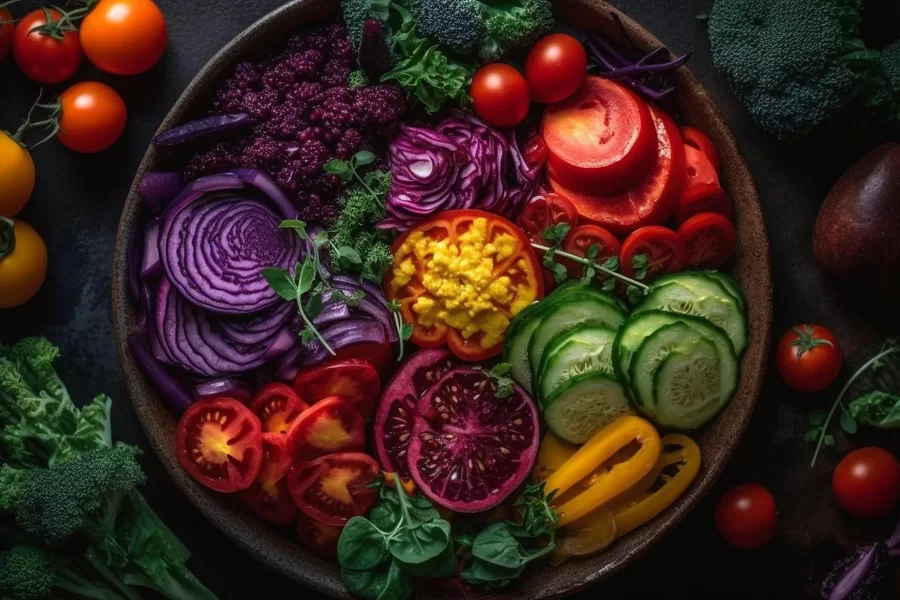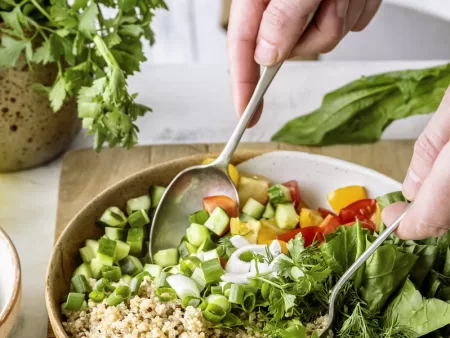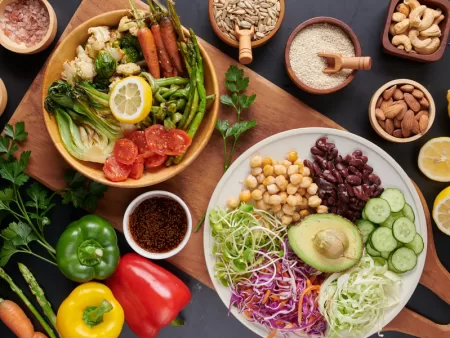
Are you tired of spinning your wheels with diets that don’t work? It’s not just about losing weight; it’s about transforming your body and health. Do you want to lose fat and build muscle effectively?
Understanding the Basics
Caloric Intake vs. Expenditure
- Caloric Deficit: To shed fat, ensure you’re using more calories than you’re eating. Think of it as spending more than your income. Your body will turn to its fat stores for extra energy, leading to weight loss.
- Caloric Surplus: Dreaming of bigger muscles? You’ll need a bit more fuel (calories). This surplus gives your body the extra resources needed to build and repair muscle tissues, especially after those tough workouts.
- Just Right: Sometimes, you just want to maintain your current physique. That’s where caloric maintenance comes in — eating just as much as you burn.
It’s not just about the quantity of calories but also the quality. Which brings us to our next point…
Macronutrient Balance
Macronutrients are the VIPs of your diet – proteins, carbohydrates, and fats. Each plays a unique role:
- Proteins: These are the building blocks of muscle. Aim for high-quality sources like lean meats, dairy, or plant-based options.
- Carbohydrates: Carbs are your body’s favorite energy source, especially during exercise. But not all carbs are created equal! Focus on whole grains, fruits, and veggies for sustained energy.
- Fats: Often misunderstood, fats are actually essential! They help absorb vitamins and keep your hormones in check, which can aid muscle growth. Look for healthy fats in nuts, seeds, avocados, and fish.
Striking the right balance of these macronutrients can fuel your workouts and recovery, leading to better muscle gain and fat loss.
Exercise: Your Dynamic Duo
Last but definitely not least, let’s talk about exercise. Combining strength training and cardiovascular workouts is like having a dynamic duo fighting for your fitness goals:
- Strength Training: This includes weight lifting, bodyweight exercises, and resistance training. It’s all about challenging your muscles to make them stronger and bigger. Plus, muscle burns more calories even at rest, boosting your metabolism.
- Cardiovascular Exercise: Running, swimming, cycling – anything that gets your heart rate up falls into this category. It’s great for burning fat, improving heart health, and increasing endurance.
Mastering Nutrition and Exercise for Body Goals
Protein: Your Muscle Mate
Why Protein Matters: Think of protein as your gym buddy for building muscle. It helps repair and grow muscle fibers, making you stronger with each workout.
How to Get It: Fill up on chicken, fish, eggs, or plant-based proteins like beans and tofu. Aiming for 1.6 to 2.2 grams per kilogram of your body weight daily will keep your muscles happy and growing.
Healthy Fats: Don’t Fear the Fat
Benefits of Fats: Fats are crucial for healthy hormones and providing energy. They’re not the enemy but your ally in staying full and fueled.
Where to Find Them: Avocados, nuts, and seeds are excellent sources. They not only taste great but also provide the energy and nutrients your body needs for muscle building and recovery.
Carbs: The Energy Givers
Role of Carbs: Carbohydrates are your main source of energy, especially when you’re active. They power up your workouts and help with muscle recovery.
Smart Carb Choices: Opt for whole grains, vegetables, and fruits to fuel your body. They release energy slowly, keeping you going longer and stronger.
Water: The Ultimate Hydrator
Importance of Hydration: Water is vital for life and your workouts. It keeps your body functioning optimally, aids digestion, and helps transport nutrients to where they’re needed.
Staying Hydrated: Drink plenty of water throughout the day. If you find plain water boring, infuse it with fruits or mint for a refreshing twist. Keep sipping and stay hydrated to keep your body in top shape.
Eating Right and On Time
Nutrient Timing: The timing of your meals can significantly impact your energy and recovery. Eating smaller, frequent meals ensures a steady supply of nutrients to your body.
Meal Planning: Spread your food intake over 5-6 smaller meals. Include a mix of protein, carbs, and fats in each to keep your energy levels stable. After working out, grab a protein-rich snack to kickstart muscle repair.
Remember, the journey to a healthier body is personal and unique. Adjust these strategies to fit your lifestyle and listen to your body’s needs. With consistency and patience, you’ll be on your way to reaching your fitness goals. Here’s to a healthier, stronger you!
Your diet
Don’t know how to start eating right and what’s best to eat? Here is a compiled diet that may make it easier for you to resolve these issues.
Breakfast
- Oatmeal Delight: Cook some oats and top them with your favorite fruits like apples or bananas. Add a sprinkle of cinnamon for extra flavor.
- Toast and Avocado: Toast some whole grain bread and spread some creamy avocado on top. It’s simple, tasty, and filling.
- Egg Scramble: Scramble a couple of eggs and toss in some veggies like tomatoes or spinach. This protein-packed meal will keep you full until lunch.
Lunch
Lunch is important to keep your energy up through the day. Think of it as recharging your body’s batteries.
- Chicken Salad: Mix some grilled chicken with lots of greens like lettuce and spinach. Add cucumbers and tomatoes for a fresh touch.
- Veggie Quinoa Bowl: Quinoa is a great source of protein. Mix it with veggies like bell peppers and zucchini for a colorful, healthy lunch.
- Whole Grain Sandwich: Make a sandwich with whole grain bread, turkey or chicken breast, lettuce, and a slice of cheese. Simple and delicious!
Dinner
Dinner is the time to relax and enjoy a hearty meal. It’s best to eat dinner a few hours before bed so you have time to digest.
- Grilled Fish: Grill some fish like salmon or trout. Serve it with steamed veggies and brown rice for a well-rounded meal.
- Stir-Fry Magic: Stir-fry some chicken or tofu with a mix of vegetables like broccoli, carrots, and bell peppers. Serve it over brown rice or noodles.
- Pasta Night: Cook some whole wheat pasta and mix it with tomato sauce and veggies. Add lean meat or beans for protein.
Snacks
Snacks are great for keeping your energy up between meals. Choose snacks that are nutritious and satisfying.
- Fruit Fun: Keep it simple with a piece of fruit like an apple or a banana. It’s nature’s fast food!
- Nutty Mix: A small handful of nuts can give you a quick energy boost.
- Yogurt and Berries: A bowl of yogurt with some berries is not only tasty but also good for your gut health.
Staying Hydrated
Drink plenty of water throughout the day. It keeps you hydrated and helps your body function at its best. Herbal teas and black coffee are also good choices, but try to limit sugary drinks.
Remember, the key to a healthy diet is balance. Don’t be too hard on yourself if you have a treat now and then. It’s all about making better choices most of the time.
Supplementing Your Way to Better Health and Strength
Sometimes, our bodies need a bit more to help us along the way. That’s where supplements come in. They’re not replacements for a balanced diet, but they can help fill in nutritional gaps.
Protein Powerhouses
What You Need to Know: Your muscles love protein! It’s crucial for building and repairing muscle tissue. But sometimes, you might not get enough from your diet alone, especially if you’re very active. That’s where protein supplements like whey, casein, or plant-based blends come in handy.
How to Use: Mix them into smoothies, pancakes, or just shake them up with water or milk. They’re a convenient way to boost your protein intake, especially after workouts when your muscles are eager for nourishment.
Creatine: The Energy Enhancer
Why It’s Great: Creatine is like a little energy boost for your cells. It helps you perform better in short, intense workouts—think lifting weights or sprinting. It’s one of the most popular supplements for boosting muscle mass and strength.
Using Creatine: It’s usually taken in powder form. You can mix it with water or into a post-workout shake. Many people notice they can work out harder and recover faster when they supplement with creatine.
Amino Acids: The Muscle’s Building Blocks
Understanding Amino Acids: Amino acids are what proteins break down into. They’re super important for everything from building muscle to keeping your immune system strong. BCAAs, or Branched-Chain Amino Acids, are three specific amino acids that are really important for muscle health.
Why Supplement: If you’re working out hard, your body might need more of these than you’re getting from food alone. Supplementing with BCAAs can help protect your muscles from breaking down and support faster recovery.
Adding supplements can be a game-changer in your health and fitness routine, but remember, they’re just part of the picture. A healthy diet, regular exercise, and good sleep are foundational. And, as always, talk to a healthcare professional before starting any new supplement, especially if you have health conditions or take other medications. Here’s to a healthy, strong, and informed you!
Injury-Free Workouts
Keeping fit and strong is great, but it’s important to do it safely to avoid getting hurt.
Learn and Practice the Right Moves
When you exercise, making sure you’re doing it right is super important. Each type of exercise needs to be done in a certain way to keep you safe. Whether you’re running, lifting weights, or stretching, take the time to learn the right way to move. Doing exercises correctly helps keep your body safe from injuries.
Warm-Up Your Body
Before you jump into your workout, start with a warm-up. Think of it like getting your body ready for action. You can do some light walking, easy jogging, or some gentle stretches. Warming up gets your muscles ready and flexible, which can help prevent injuries during more intense exercise.
Listen to Your Body
Your body is pretty smart and will tell you when something isn’t right. If you feel pain or something feels off, it’s important to listen and maybe even stop what you’re doing. It’s better to rest for a little bit than to ignore the pain and end up with a bigger injury.
Rest is Important
Rest days are a big part of staying healthy and strong. Your body needs time to recover and heal, especially after intense workouts. Make sure you’re not working out too hard all the time and give your body a chance to rest and recover. This helps you come back stronger and reduces the risk of injuries.
By focusing on these simple tips, like learning the right way to exercise, warming up, listening to your body, and resting, you can keep your workouts safe and fun. Remember, taking care of your body helps you stay on track with your fitness goals and keeps you moving and grooving without injuries!
The importance of training
Enhances Metabolic Rate
Training increases your metabolic rate, which is the rate at which your body burns calories. A higher metabolic rate is beneficial for weight loss as it helps your body to burn more calories throughout the day, even when at rest.
Builds Muscle Mass
Specific training activities are designed to stress the muscles, causing them to adapt and grow stronger over time. Increased muscle mass not only improves overall strength and endurance but also contributes to a more toned and defined physique.
Improves Physical Health
Regular training improves cardiovascular health, increases lung capacity, and enhances overall physical stamina. It also helps in reducing the risk of chronic diseases, maintaining healthy blood pressure levels, and improving bone density.
Promotes Mental Well-being
Engaging in regular training routines can have positive effects on mental health. It is known to reduce symptoms of depression and anxiety, enhance mood, and increase feelings of well-being due to the release of endorphins during physical activity.
Incorporating regular training into your lifestyle is a commitment to your health. It requires dedication and consistency, but the benefits are well worth the effort. Whether your goal is to lose weight, gain muscle, or simply improve overall fitness, training is a powerful tool that will help you achieve these objectives.
Conclusion
When building muscle or losing weight, both training and nutrition are important. Protein comes first, followed by fats and carbohydrates. Fats are often perceived as the negative character in healthy eating, but they really are not. They play a very important and positive role for the body, but the main thing is balance. If your diet does not have enough certain elements, then various supplements can help you: protein, creatine, and the like. Protein is most often consumed with food, and creatine is taken in powder or shake form.
To avoid getting injured during training, you should warm up before training, stretch every part of your body, and monitor your body language during training. If you suddenly feel pain, this is a sign of the end of your workout or a minor injury. It is best to understand the movements, know how to do them correctly and monitor your breathing. But it’s even better to work out with a coach who will control you.
FAQs
Protein comes first and is the most important point in human nutrition. Next are carbohydrates and proteins. If you don’t have enough of them in your diet, you can use protein powder.
You can mix it into dough, consume it with food, post-workout cocktail/water/milk. But it’s important to know and figure out whether you need this protein at all and whether it’s right for you.
Do a good warm-up, stretch every part of your body well. Listen to what your body and well-being are telling you. If you suddenly feel pain, it is better to stop training. It is best to analyze each movement before training and know how to do it correctly. But it’s even better to work out with a trainer who can always correct you.







